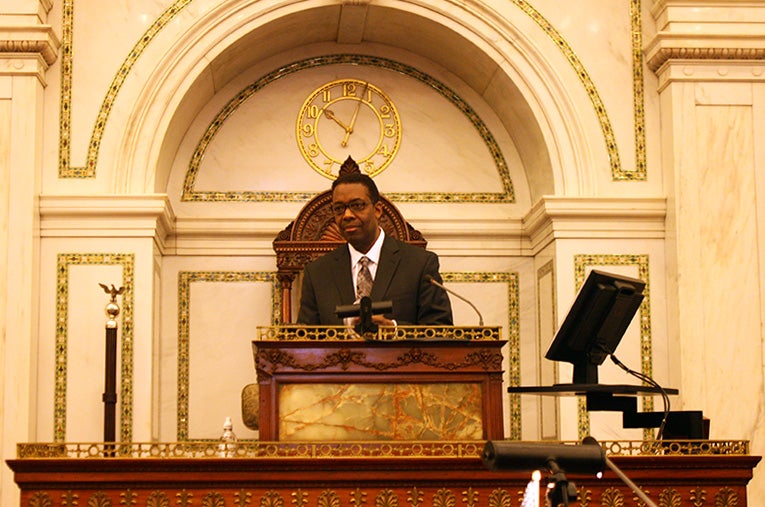City Council starts the year with a handful of revenue- and job-generation bills

In their first meeting of 2012, City Council members introduced a raft of bills and resolutions both ceremonial and substantial, including two bills previously submitted by Councilman Darrell Clarke at the end of last year. Thursday’s meeting had an inaugural air; it was the first for six new Council members, and Clarke’s first as Council President.
Among the bills and resolutions introduced at the meeting were:
· A resolution from Councilwoman Maria Quiñones-Sánchez to review the School District’s zero-tolerance policy, particularly as it affects the poor and minorities
· A resolution from Councilwoman Marian Tasco naming Sonia Sanchez the official Poet Laureate of Philadelphia
· Five bills from At-Large Councilman Bill Green aimed at creating jobs for Philadelphians. One effect of this legislation would be that all jobs created for publicly funded projects in the City be filled by residents of Philadelphia, according to a press release issued by Green’s office
· A resolution from Bill Green, on behalf of Council President Clarke, creating a “mandatory Asset Sales Optimization Fund.” The Fund would hold income from the sale of city-owned real estate and other assets. It would be discrete from all other municipal funds and managed by the Director of Finance. The bill proposes allowing Philadelphia voters to decide whether to create such a fund in the election scheduled for April 24, 2012. After the meeting, Council President Clarke described the bill as a way to reduce the City’s debt without drawing money from the General Fund
· A bill from Councilwoman Blondell Reynolds Brown which would allow bars to stay open until 3 a.m., with the extra hour of liquor tax revenue going to the School District. Brown’s office estimates the bill could generate an extra $5 million a year for Philadelphia schools. In order to move forward, the Pennsylvania State General Assembly will have to pass enabling legislation of its own.
The bills and resolutions were referred to committees or placed on the calendar for first reading at the next Council session, with one exception. The resolution naming Sonia Sanchez Poet Laureate was passed at the end of the meeting.
Two bills, creating “Development Districts” and allowing for advertising on municipal property, were reintroduced at Thursday’s meeting. Council President Clarke had introduced them at the end of Council’s last session as a way, he explained, of getting the public aware of his agenda ahead of the new year. These two bills were the subject of previous PlanPhilly coverage.
“The bills died at the end of the term,” Clarke said. “I did that because I wanted people to know that that was one of my priorities, and it got a lot of attention. People are now working with the [Nutter] administration on implementation. So we reset the table today by introducing [the bills].”
Clarke said the bills would likely get a committee hearing in the next two weeks and move forward from there. The municipal advertising bill, in particular, is bound to stir some controversy.
Mary Tracy, executive director of SCRUB, a group which advocates for the de-cluttering of public space, said it’s still unclear what the advertising bill would allow, specifically.
“It seems like it’s still very half-baked,” Tracy said.
Tracy said she was unsure whether there would be a version of the bill that SCRUB could support, but that she thinks there are better ways to generate revenue. She said that the City should do a better job of collecting taxes that it is already owed rather than allowing private companies to put signs on public property. She also pointed out that advertising is not a bottomless source of revenue.
“There is a finite amount of advertising money in the city,” Tracy said. She said that advertisers now don’t simply won’t more space to place signs, but compete for the most noticeable advertisements. “It’s a race to the gaudiest, ugliest, most blighting sign,” she said.
Councilman Clarke’s office did not respond to a request for comment, but Clarke did indicate in his swearing-in speech that he wants to go about the municipal advertising initiative in a measured way. His bill directs the City Planning Commission to develop regulations for implementing the policy. Former members of the Zoning Code Commission are also at work re-writing the sign controls for the new zoning code.
Judging from the legislative output of its first meeting of 2012, Council’s priorities are clear: the City needs more money, and it doesn’t want to raise its constituents’ taxes.
But when is that not the case?
Contact the reporter at jaredbrey@gmail.com
WHYY is your source for fact-based, in-depth journalism and information. As a nonprofit organization, we rely on financial support from readers like you. Please give today.






